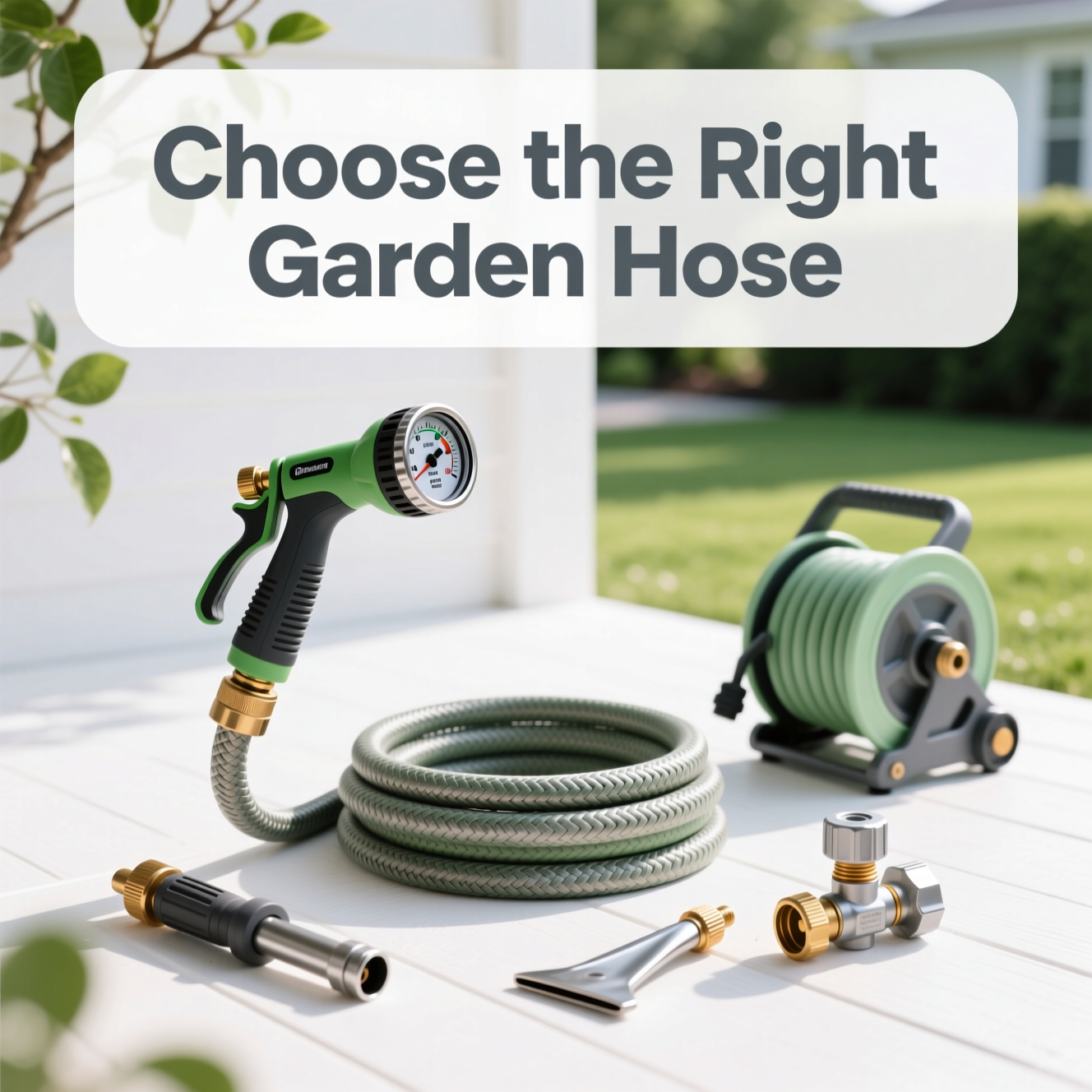What is the Best Garden Hose to Use with a Pressure Washer?
Selecting the best garden hose for a pressure washer is crucial for safe and efficient operation. Your water supply hose, often called an inlet hose, must adequately feed the pump. For most gardeners, a kink-resistant hose is essential to maintain consistent water flow to the unit.
Modern experts recommend hoses featuring reinforced braiding for enhanced durability. Materials like PVC, rubber, or polyurethane offer good performance. Ensure the garden hose is rated for at least the minimum GPM (Gallons Per Minute) your pressure washer requires. A common minimum is 5 GPM for electric models and 7-10 GPM for gas units. Using a hose with inadequate flow can reduce pressure washer output by up to 30%.
What Diameter Garden Hose is Best for a Pressure Washer?
Selecting the correct garden hose diameter is crucial for optimal pressure washer performance. An undersized hose can restrict water flow to the pump, leading to reduced cleaning power. For most residential pressure washers, a 5/8-inch internal diameter hose generally provides sufficient water supply. This size ensures adequate GPM to meet the pump’s requirements. Modern best practices emphasize using the right hose to prevent pump strain.
Increasing the hose diameter from a standard 1/2-inch to a 5/8-inch can boost water flow by approximately 15%. For higher-powered units or extended hose runs, a 3/4-inch hose is often recommended. This larger diameter minimizes flow restriction, even over longer distances. It ensures consistent water pressure, preventing the pump from cavitating. Investing in a proper hose diameter enhances both the longevity and effectiveness of your pressure washer.
Does Garden Hose Length Affect a Pressure Washer’s Performance?
The length of your garden hose significantly impacts your pressure washer’s efficiency. A longer hose can introduce friction loss, reducing the water volume reaching the pump. This effect is more pronounced with smaller diameter hoses, diminishing the overall cleaning power. For optimal performance, it’s best to use the shortest effective hose length possible.
Experts recommend limiting the supply hose length to around 50 feet, particularly for electric pressure washers. Every 50 feet of garden hose can contribute to a pressure loss of approximately 1 PSI due to increased friction. This reduction in water supply can strain the pump and decrease the machine’s pressure drop capability. Choosing a hose with good kink resistance also ensures a consistent flow, further aiding water supply.
How Do You Connect a Pressure Washer to a Garden Hose?
Connecting a garden hose to a pressure washer involves securing a watertight seal at the water inlet. Most pressure washers feature a standard 3/4-inch garden hose thread (GHT) inlet. Ensuring this connection is properly made prevents water loss and maintains optimal machine performance.
For most gardeners, the process begins by examining the garden hose coupling for a rubber washer. This small but crucial component, often an O-ring, is essential for preventing leaks. A secure connection, achieved by hand-tightening the brass fitting, can prevent up to 90% of inlet water leaks. This quick-connect method simplifies the setup process, allowing for immediate operation.
Can You Use Expandable or Flexi Hoses with a Pressure Washer?
Using an expandable hose or a flexi hose with a pressure washer is generally not advised. These lightweight hoses often lack the necessary structural integrity for high-pressure applications. Their typical construction, often using thin PVC tubing, is not designed to withstand the significant back-pressure generated by pressure washer pumps, potentially leading to hose failure.
Standard expandable hoses frequently exhibit burst pressure ratings well below 200 PSI. In contrast, pressure washer inlet requirements can demand sustained flow rates that these hoses cannot reliably manage. This discrepancy in pressure rating and durability means a flexi hose could rupture unexpectedly. Such an event not only stops your cleaning task but can also damage the pressure washer’s pump or create a dangerous spray hazard.
Do You Need a Garden Hose for a Pressure Washer?
Yes, a garden hose is essential equipment for nearly all standard pressure washers. It directly connects the unit to a reliable water source. Without this connection, the pump cannot receive adequate running water to operate effectively. This setup ensures the machine draws sufficient volume and pressure from your faucet.
A pressure washer requires a constant and sufficient supply of water. The inlet connection on the pressure washer is designed for a standard garden hose. Attempting to use a pressure washer without a connected hose, or with an inadequate water source like a gravity feed, will prevent it from functioning. Some high-end units might have direct plumbing capabilities, but most residential models rely on a hose.
Modern best practices emphasize using a properly sized hose for optimal water flow. This ensures the pump achieves its rated pressure and volume. Without a direct water supply hose, a pressure washer cannot draw enough water to operate, rendering it useless. This makes the garden hose a fundamental component for any pressure washer setup.

Tyler manages the physical testing of LEDs, pumps, and sensors. With a background in mechanical systems, he is the architect behind our ROI and Yield calculators, transforming complex hardware specs into actionable data for our readers.

